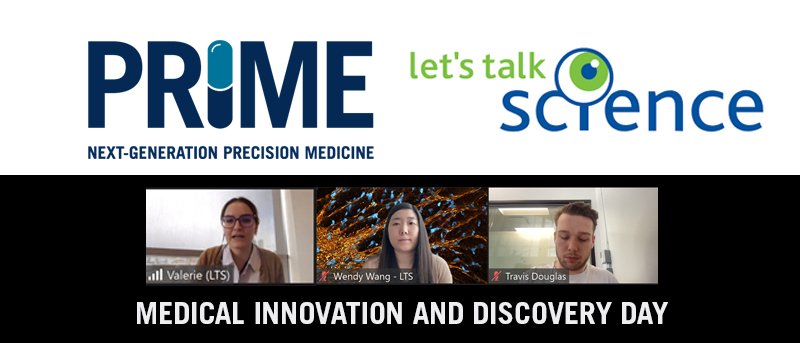On April 8, 2022, PRiME and Let’s Talk Science (LTS) hosted the first annual Medical Innovation and Discovery Day for over 30 grade 10 students from schools across Toronto.
One of PRiME’s central tenets is the training of the next generation of scientists to develop new solutions that address unmet needs in the treatment of human disease. Expanding on PRiME’s track record of developing training opportunities at the university-level, we are keen to provide interdisciplinary, application-based, hands-on learning opportunities to foster STEM engagement in high school classrooms. Leveraging the PRiME faculty and trainee community’s research expertise, we collaborated with Let’s Talk Science (LTS) to bring hands-on, minds-on activities that connect principles taught in the Ontario high school science curriculum to real world applied solutions in health and disease.
While we were remiss that we cannot hold these activities in-person, the virtual platform allowed for greater access for students, some of whom were joining us through Zoom from their classrooms and others logging in at home - in different parts of the city who may not have easy access to the downtown core and the campus.
Through this event, PRiME aimed to showcase technologies and applications, breaking down silos in science education as individual subjects and emphasizing the importance of multidisciplinary collaboration between biologists, chemists, and engineers in creating innovative solutions to healthcare. This is perfectly embodied in the career panel to kick off the afternoon – a lineup of outstanding PRiME scientists at different career stages featuring PhD students Valerie Facca (Dr. Ray Reilly’s lab) and Travis Douglas (Dr. Leo Chou’s lab), postdoctoral fellow Dr. Wendy Wang (Dr. Leo Chou’s lab), Assistant Professor Dr. Omar Khan from the Institute of Biomedical Engineering. The panel provided insight on a day in the life of a scientist and what got them interested in biomedical research and designing therapeutics. They also provided great advice for those feeling stressed about not knowing what to pursue for their careers (don’t worry!), emphasizing the importance of following what excites you and working hard to do the best you can in that.
The hands-on activities, developed and delivered by PRiME trainees, introduced nanomedicines to students and technologies in drug design and delivery. Drawing from their own research, the team of PhD students Valerie Facca, Constantine Georgiou (Dr. Ray Reilly’s lab), and Jack Bufton (Dr. Christine Allen’s lab) designed a stimulating lesson on nanoparticles and how to design drugs to target specific tissues and molecules in the body. In breakout rooms, volunteers helped teams of students design their own nanomedicine and discuss strategies in pairing different components to meet their need in treating a specific disease. They then learned about medical imaging and how their nanomedicines can be tracked to make sure that it reaches the destination that it’s designed to target.
The next lesson was designed by Dr. Wendy Wang and Travis Douglas, who brought the concept of DNA origami – a technology that the Chou lab is using as a platform of drug delivery – to the students using household items. In breakout rooms, students were introduced to the idea of folding, first using paper origami, before trying to fold shapes using string and pipe cleaners. This activity exemplified the integrity of double-stranded DNA to fold into different shapes more easily than single-stranded DNA, which is a lot flimsier. Through this technology, scientists have been able to create all sorts of different shapes out of DNA from letters of the alphabet to happy faces at the microscopic level. The application of this technology in building 3D nanostructures for delivery was demonstrated by using the same pipe cleaners to scaffold around different shapes, such as a virus made out of a Styrofoam ball and playdoh.
As the school day came to a close, we concluded our event with a Kahoot quiz that allowed the students to test their knowledge and win science prizes. A big thank you to all of our volunteers and panelists mentioned above, as well as PhD students from the PRiME community Karishma Kailass (Dr. Andrew Beharry’s lab) and Lauren Baerg (Dr. Radhakrishnan Mahadevan’s lab), and Brahmdeep Saini from LTS for leading breakout room activities. Lastly, this event would not have been possible without the efforts of Sandhya Mylabathula, LTS’s Coordinator of Large Events and Partnership Development, who not only moderated this event but has been working tirelessly with us in the months leading up to develop these activities.
Studies have shown that instilling engagement and interest in science at an early age is key to having more students choose these disciplines in senior high school grades, post-secondary education, and future career paths. PRiME hopes to further develop outreach programming, working with LTS on this event annually and future in-class modules and virtual toolkits that can facilitate critical thinking and demonstrate the practical application of science and engineering. It is our hope that we can develop programming to reach students across the city and beyond, particularly in under-resourced and remote communities, engaging more students in applied research and creating future leaders in academia and biotech in Canada.




